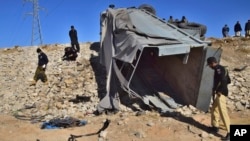The United States has designated several commanders of militant groups, including a top anti-Pakistan militant leader, operating in Afghanistan as global terrorists.
The U.S. State Department announced the designations Thursday amid regional concerns terrorists have had more operational freedom on Afghan soil after the return of the Islamist Taliban to power in the conflict-ridden South Asian country.
Osama Mehmood, the chief of al-Qaida in the Indian Subcontinent - a regional branch of the global terror network - and two of his associates have been added to the list of "global terrorists."
The U.S. also designated Qari Amjad, the deputy chief of the Tehrik-i-Taliban Pakistan, known as the Pakistani Taliban, for waging deadly terrorist attacks in Pakistan from its Afghan bases.
The statement quoted U.S. Secretary of State Antony Blinker as saying the designations are "part of our relentless efforts to ensure that terrorists do not use Afghanistan as a platform for international terrorism."
Blinken said that Washington would continue to use "all relevant tools to uphold our commitment to see to it that international terrorists are not able to operate with impunity in Afghanistan."
U.S. officials said Amjad "oversees operations and militants" in the northwestern Pakistani province Khyber Pakhtunkhwa, which borders Afghanistan and has borne the brunt of stepped up TTP attacks in recent months.
The TTP in a statement issue Friday denounced the U.S. terrorist listing of Amjad, claiming it does not need to use Afghan soil nor does it pose a threat to the global community. The group asserted that its activities were limited to the territory of Pakistan.
"The United States should not interfere in the affairs of other countries or side with oppressive forces," the statement said.
Thursday's listing of the four militants as "Specially Designated Global Terrorists" for their leadership roles in their respective groups makes it a crime for all U.S. citizens to engage in any transactions with them, and it blocks their assets in the United States.
The Taliban took control of Afghanistan in August 2021 when all U.S. and NATO-led troops withdrew from the country after two decades of war with the then-insurgent Taliban and al-Qaida terrorists.
President Joe Biden defended the troop exit, saying the U.S. military was capable of tackling the threat of terrorism without its presence on the Afghan territory.
An American drone strike on July 31 killed fugitive al-Qaida chief Ayman al-Zawahiri, who had moved to a safe house in the Afghan capital, Kabul, after the foreign military withdrawal.
The Biden administration accused the Taliban of breaching repeated assurances to the world that they would prevent transnational terrorists from using Afghan soil as a sanctuary.
Taliban leaders maintain they were not aware of al-Zawahiri's presence in Kabul and the incident was under investigation.
The latest U.S. terror designations came on the same day Pakistan warned growing cross-border terrorism emanating from Afghanistan was "alarming and dangerous" for regional peace.
"[The Taliban] have given assurances to the world that they would not allow the use of Afghanistan's soil by terrorist outfits, and they should deliver on their pledges," Interior Minister Rana Sanaullah told reporters in Islamabad on Thursday.
TTP attacks have dramatically increased in Pakistan since the Taliban seized power in the neighboring country, killing hundreds of people, mostly security forces. Leaders and commanders of the outlawed group, already listed as a global terrorist organization by the U.S., have log taken shelter in Afghanistan.
"If the TTP is claiming responsibility for terrorist activities in Pakistan, it should be a matter of serious concern for the government of Afghanistan because their soil is being used for terrorism," Sanaullah said.
The Taliban deny they allow TTP or any other group to use Afghan territory for plotting cross-border terrorist attacks and say they will try for treason anyone found guilty of such crimes.




